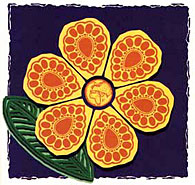 |
|
|
 Visible Women Visible WomenBy Wendy Rickard editor@isoc.org In most Western countries, we don't think much about food or farming beyond what may or may not be in the fridge when we get home from work. In developed regions, food is grown, processed, packaged, and made available for sale at phenomenally low prices at the local supermarket. Farm stands are popular among the gotta-get-connected-to-the-earth-in-my-Range-Rover crowd, but much of what we eat is the output of an enormous agribusiness industry. Farming is not just big business; it's also a man's world. Rarely does the mention of a farmer conjure up a picture of a woman on a tractor. Not so in much of the rest of the world, where statistics contradict the stereotype of the farmer as a man, according to the Food and Agriculture Organization of the United Nations (FAO)). On its news page promoting Food Day 1998, which carries the theme Women Feed the World, the organization points out that "globally, women produce more than half the food that is grown." In sub-Sahara and the Caribbean, reports the FAO, they produce up to 80 percent of basic foodstuffs. In Asia 50 to 90 percent of the work in rice fields is done by women. Even though women in urban and rural areas bear primary responsibility for feeding children and other family members, they also are least likely to be landowners. In fact, according to Sissel Ekaas, director of the FAO's Women and Population Division, they own about 2 percent of all land--a handicap that helps keep women in those regions poor. Anyone with a basic understanding of economics--let's just forget politics for the moment--knows that economically empowered groups strengthen national economies. In the United States, for instance, it is widely believed that recent explosive growth in the individual investor community has helped bolster the economy. That growth also may explain why the economy is now able to withstand a few hardy jolts, as it has done in the past few months; turns out that small investors don't panic as easily as seasoned Wall Streeters. A lot of those individual investors are saying that access to the Internet has helped them become regular investors by making it easier to research stocks and mutual fund companies, keep up with market news, and conduct transactions. Quite simply, the Internet has helped empower an important segment of the population by making it easier--and even cheaper--for individuals to educate themselves about investing and to take financial control of their lives. And the economy as a whole has benefited. A few organizations are now working on applying that same principle to developing regions, especially in regard to women and their role as food producers, food shoppers, and food preparers. In addition to the FAO,Winrock International--an Arkansas-based nonprofit, nonsectarian organization de dicated to reducing poverty and hunger through sustainable agriculture, natural resource management, and renewable energy--has taken a multifaceted approach to addressing the needs of women while solving problems related to food and farming. As described by authors Sarah Tisch and Ken Herman in "Food, Farming, and Women's Leadership in Africa" , Winrock International advances the fairly obvious notion that for women to become empowered, they need first to become educated. To that end, Winrock has created an electronic learning network for use with its African Women's Leaders in Agriculture and Environment (AWLAE) project. This learning network comprises a distance-learning strategy that enables women to communicate and enables nongovernmental organizations to share technical and management information. In brief, the organization aims to create a cadre of highly trained women in agricultural sciences who will work in their countries and regions and devote their efforts to solving the problems faced by female farmers and rural households. Unfortunately, politics and cultural influences help propagate and perpetuate a distorted picture of the role women play in the very foundation of human life in developing regions. The FAO points out that "despite their overwhelming contribution to food security--particularly in the poorest areas of the world's poorest countries--women are often invisible--economically, statistically, and in popular and media images." As we've learned in the developed world, educated segments of the population rarely are invisible. They are in fact not only visible but also powerful--politically, economically, and culturally. It is, after all, the most educated segments of the population in developed regions that possess the most wealth and that are most likely to be connected to the Internet As Tisch and Herman explain in their article, farming means food.
"It is not difficult to understand," they write, "that for an
economy to develop, citizens need to spend less time looking for
food and more time going to school, building businesses, and,
in general, living." By providing the kind of assistance that
will help empower the segment of the population most responsible
for food, Winrock is advancing an agenda that is at once noble
and practical. Winrock is--as it describes itself--helping to
prepare a critical mass of self-confident, risk-taking, pioneering
women leaders to change the policies, programs, and practices
that affect women farmers in Africa. And by leveraging the power
of the Net and its ability to facilitate distance learning and
communication, programs such as this one are a good example of
what we hope the Internet can do. |

